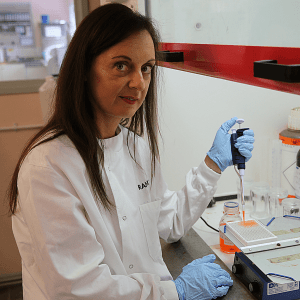New test developed by Randox will reduce severe side effects of chemotherapy for leukemia patients
New test developed by Randox will reduce severe side effects of chemotherapy for leukemia patients
Global healthcare company Randox, recently unveiled as the sponsors for the Grand National 2017 under the banner of Randox Health, today announced it has been awarded an Innovate UK Award, for their pioneering work in the development of a diagnostic test for Acute Myeloid Leukemia patients.
Randox’s award-winning test will enable the stratification of Acute Myeloid Leukemia (AML) patients, to determine patient response, before chemotherapeutic treatment. Currently, aggressive chemotherapy is given at diagnosis for the 2900 patients diagnosed with Acute Myeloid Leukemia every year in the UK, yet up to 40% of patients do not respond to this treatment due to the type of their cancer cells, and the patient’s genetic make-up.
The competition was therefore designed to promote the development of new diagnostic products and services for use in stratified medicine; in this case studying groups of leukemia patients to predict which treatments their cancers are likely to respond to.
Dr Cherith Reid, Project Manager for the AML Test at Randox, commented;
“As with any illness, it is important to select the best treatment and care for AML patients based on their diagnosis. The majority of AML patients are over 60 years old, and with the rise in the elderly population, increased prevalence of the disease is predicted. Currently, patients in this age range who are deemed fit for treatment are prescribed cytarabine chemotherapy, where the patient’s reaction to this drug is uninformed and is based on a trial-and-error approach. The information provided by our test will allow us to identify patients whose cancer is drug responsive, and treat them accordingly, possibly with lower doses of chemotherapy, reducing its severe side-effects. We want to assist clinicians in selecting the best treatment and care for patients as early as possible to improve patient outcomes.”
Phase one of the project includes an economic study to measure the health economic benefits for The National Health Service, conducted by The National Institute for Health Research Diagnostic Evidence Co-Operative London.
Professor George Hanna, NIHR DEC London Centre Director, commented;
“The stratification of patients within the NHS has been widely acknowledged as an important method for the efficient use of resources, as well as improving patient experience. New in vitro diagnostic tests that can classify patients in this way – such as the test being developed at Randox for Leukemia patients – personalise patient care to better inform treatment decisions which will hopefully lead to improved health outcomes and fewer side effects. This is particularly important for Leukemia patients who face the severe side effects of chemotherapy. Through the collaboration of Randox Laboratories and the NIHR Diagnostic Evidence Co-operative London, we have a unique opportunity to evaluate the adoption pathway of the new Randox AML technology to translate it to the bedside where it can best benefit patient care.”
“Determining Acute Myeloid Leukemia patient response to chemotherapeutic treatment” was selected by Innovate UK in the “Stratified Medicine: connecting the UK infrastructure” competition.
Pictured: Dr Cherith Reid

